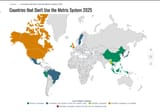Anonymous
(ID: cChvncIx)
 9/6/2025, 2:42:13 AM
No.514918048
>>514918107
>>514919277
>>514920599
>>514921258
>>514921550
>>514922227
>>514922434
>>514922682
>>514922723
9/6/2025, 2:42:13 AM
No.514918048
>>514918107
>>514919277
>>514920599
>>514921258
>>514921550
>>514922227
>>514922434
>>514922682
>>514922723
when will America switch to metric
Is there any reason to be the only country in the world to still use the imperial system?
We often hear Americans saying the imperial is better for everyday use, but a lot of the conversions are constants.
1 kilo is 2.2 pounds,
100 kilos is 220 pounds.
1 mile is 1.6 kilometers
A pint is around 0.5 liters.
A cup is around 2.84 deciliters.
An ounce is around 28.35 grams.
Water freezes at 0 C° and boils at 100 C°.
I fail to see how imperial is allegedly better in everyday use. If you learn the metric system it's very easy to do conversions.
1 kilo is 1000 grams.
1 liter is 10 deciliters.
1 kilometer is 1000 meters.
1 liter of water is 1 kilo.
In the kitchen you can use a measurement of 1 deciliter for both liquids and solids like flour or sugar.
The average internal combustion engine consumes about 10 liters per 100 kilometers.
The average height and weight for an European male is
180 centimeters
70 kilograms
(versus 5 feet 11 inches and 154 pounds)
The average big mf is 200cm/100kg
Internal conversions in the metric system are much easier. Can't do the imperial without a conversion table and a calculator.
We often hear Americans saying the imperial is better for everyday use, but a lot of the conversions are constants.
1 kilo is 2.2 pounds,
100 kilos is 220 pounds.
1 mile is 1.6 kilometers
A pint is around 0.5 liters.
A cup is around 2.84 deciliters.
An ounce is around 28.35 grams.
Water freezes at 0 C° and boils at 100 C°.
I fail to see how imperial is allegedly better in everyday use. If you learn the metric system it's very easy to do conversions.
1 kilo is 1000 grams.
1 liter is 10 deciliters.
1 kilometer is 1000 meters.
1 liter of water is 1 kilo.
In the kitchen you can use a measurement of 1 deciliter for both liquids and solids like flour or sugar.
The average internal combustion engine consumes about 10 liters per 100 kilometers.
The average height and weight for an European male is
180 centimeters
70 kilograms
(versus 5 feet 11 inches and 154 pounds)
The average big mf is 200cm/100kg
Internal conversions in the metric system are much easier. Can't do the imperial without a conversion table and a calculator.



